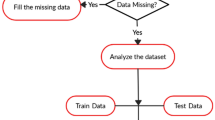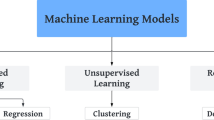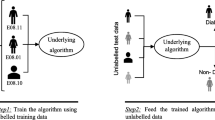Abstract
For the design and implementation of Clinical decision support system, computation time and prognostic accuracy are very important. To analyze the large collection of a dataset for detecting and diagnosis disease machine learning techniques are used. According to the reports of World Health Organizations, heart disease is a major cause of death and killer in urban and rural areas or worldwide. The main reason for this is a shortage of doctors and delay in the diagnosis. The outcome presaging of this disease is a very challenging job. This proposed work used the approach of self-diagnosis algorithm, fuzzy artificial neural network, and NCA and PCA and imputation methods. By the use of this technique reduces the computation time for prediction of Coronary heart disease. For the implementation of this the two datasets are using such as Cleveland and Statlog datasets. In this research work, heart disease is a diagnosis by used the clinical parameters of patients for early stages. Classifiers used for that random forest algorithm, ANN, and K-NN algorithm. The datasets for the disease prediction measure are used to accurately calculate the difference between variables and to determine whether they are correlated or not. For this classification model, the performance measure is calculated in requisites of their accuracy, precision, recall, and specificity. This approach is evaluated on the heart disease datasets for improving the accuracy performance results obtained. The experimental results obtained by NCA provide greater performance in terms of performance metrics for the multiple classifiers like RF, DT, NB, SVM. The aim of this study to develop the classification model as well as show a comparative analysis between existing systems is discussed. In this paper for Cleveland dataset has taken 303 instances and 14 attributes are used. This dataset has preprocessed dataset. This paper depicts the higher accuracy score with the multiple classifiers such as Random forest,SVM, and NB using NCA is 99.34 % and for DT is 98 %. Overall NCA is best in terms of classification accuracy. The result shows not only accuracy for the proposed method but obtains better results for multiple classifiers that exhibit their reliability.in medical science, this approach is used to predict heart disease at its early stages.The outcome for KNN + SDA + NCA + Fuzzy ANN for Cleveland dataset accuracy achieved 98.56% and for Statlog dataset 98.66%. This result describes the hybrid method used for prediction of heart disease and achieved better results.








Similar content being viewed by others
References
Sridevi R (2019) An appropriate feature classification model using Kohonen network. Int J Comp Eng Technol (IJCET) 10(2):148–159
Jain D, Singh V (2018) Feature selection and classification systems for chronic disease prediction: a review. Egypt Inform J 19(3):179–189. https://doi.org/10.1016/j.eij.2018.03.002
Baccouche A, Garcia-Zapirain B, Castillo Olea C (2020) Elmaghraby a ensemble deep learning models for heart disease classification: a case study from Mexico. Information 11(4):207. https://doi.org/10.3390/info11040207
Mohan S, Thirumalai C, Srivastava G (2019) Effective heart disease prediction using hybrid machine learning techniques, vol 3. IEEE
Gujare R (2020) Heart disease prediction using ensemble learning methods. Int J Adv Sci Technol 29(6):76–85
Nilashi M, Ahmadi H, Manaf AA (2020) Coronary heart disease diagnosis through self-organizing map and fuzzy support vector machine with incremental updates. Int J Fuzzy Syst 22(4):1376–1388. https://doi.org/10.1007/s40815-020-00828-7
Karthikeyan T, Kanimozhi VA (2017) Deep learning approach for prediction of heart disease using data mining classification algorithm deep belief network. Int J Adv Res Sci Eng Technol 4(1)
Guru SM, Hsu A, Halgamuge S (2005) An extended growing self-organizing map for selection of clusters in sensor networks. Int J Distrib Sens Netw 1(2):227–243
Widiyaningtyas T, Zaeni IAE, Wahyuningrum PY (2019) Self-organizing map (SOM) for diagnosis coronary heart disease. In: 4th international conference on information technology, information systems and electrical engineering (ICITSEE)
Anooj PK (2012) Clinical decision support system: risk level prediction of heart disease using weighted fuzzy rules. J King Saud Univ Comput Inf Sci 24(1):27–40. https://doi.org/10.1016/j.jksuci.2011.09.002
Gavhane A, Kokkula G, Pandya I, Devadkar K (2018) Prediction of heart disease using machine learning. In: IEEE conference record # 42487; IEEE Xplore ISBN:978-1-5386-0965-1 (ICECA)
Kohli PS, Arora S (2018) Application of machine learning in disease prediction. In: Proceeding of 2018 IEEE international conference
Ghumbre SU, Ghatol AA (2012) Heart disease diagnosis using machine learning algorithm. In: Advances in intelligent and soft computing proceedings of the international conference on information systems design and intelligent applications
Mienye ID, Sun Y, Wang Z (2020) An improved ensemble learning approach for the prediction of heart disease risk. Inform Med Unlocked. https://doi.org/10.1016/j.imu.2020.100402
Aggarwal R, Kumar S (2022) A hybrid detection model for meticulous presaging of heart disease using deep learning: HDMPHD. Int J Recent Innov Trends Comput Commun 10(9):67–76. https://doi.org/10.17762/ijritcc.v10i9.5702
Chen M, Hao Y, Hwang K, Wang L, Wang L (2017) Disease prediction by machine learning over big data from healthcare communities. IEEE Access 5:8869–8879
Beulah Christalin Latha C, Carolin Jeeva S (2019) Improving the accuracy of prediction of heart disease risk based on ensemble classification techniques. Inform Med Unlocked 16:100203
Pouriyeh S, Vahid S, Sannino G, Pietro GD, Arabnia HR, Gutierrez JB (2017) A comprehensive investigation and comparison of machine learning techniques in the domain of heart disease. In: 2017 IEEE Symposium on Computers and Communications (ISCC), pp 204–207
Dinh A, Miertschin S, Young A, Mohanty SD (2019) A data-driven approach to predicting diabetes and cardiovascular disease with machine learning. BMC Med Inform Decis Mak 19(1):211. https://doi.org/10.1186/s12911-019-0918-5
Methaila A, Kansal P, Arya H, Kumar P (2014) Early heart disease prediction using data mining techniques. Comput Sci Inf Technol J 24:53–59
Santhana Krishnan JGS (2019) Prediction of heart disease using machine learning algorithms. In: 2019 1st international conference on innovations in information and communication technology (ICIICT), pp 1–5
Dahiwade D, Patle G, Meshram E (2019) Designing disease prediction model using machine learning approach. In: International conference on computing methodologies and communication (ICCMC). IEEE
Dinesh Kumar G, Arumugaraj K, Santhosh Kumar D, Mareeswari V (2018) Prediction of cardiovascular disease using machine learning algorithms. In: Proceeding of 2018 IEEE international conference. IEEE
Wang CW (2016) New ensemble machine learning method for classification and prediction on gene expression data. In: Proceeding of 2016 IEEE International Conference
Abdullah S, Rajalaxmi RR (2012) A data mining model for predicting the coronary heart disease using random forest classifier. In: International conference in recent trends in computational methods, communication and controls pp 22–25
Rairikar A, Kulkarni V, Sabale V, Kale H, Lamgunde A (2017) Heart disease prediction using data mining techniques. In: 2017 International conference on intelligent computing and control (I2C2). IEEE, pp 1–8
Vijayashree J, SrimanNarayanaIyengar NC (2016) Heart disease prediction system using data mining and hybrid intelligent techniques: a review. Int J Bio-Sci Bio-Technol 8(4):139–148
Kolukisa B, Hacilar H, Goy G, Kus M, Bakir-Gungor B, Aral A, Gungor VC (2018) Evaluation of classification algorithms, linear discriminant analysis and a new hybrid feature selection methodology for the diagnosis of coronary artery disease. In: 2018 IEEE international conference on big data (Big Data)
Karayılan KT, Kılıç Ö (2017) Prediction of heart disease using neural network. In: 2017 international conference on computer science and engineering (UBMK). Antalya, Turkey, pp 719–723. https://doi.org/10.1109/UBMK.2017.8093512
Acknowledgements
I Ritu Aggarwal prepared this manuscript as designing, implementing, writing and other research added under the guidance of guide Dr. Suneet Kumar.
Author information
Authors and Affiliations
Corresponding author
Additional information
Publisher's Note
Springer Nature remains neutral with regard to jurisdictional claims in published maps and institutional affiliations.
Rights and permissions
Springer Nature or its licensor (e.g. a society or other partner) holds exclusive rights to this article under a publishing agreement with the author(s) or other rightsholder(s); author self-archiving of the accepted manuscript version of this article is solely governed by the terms of such publishing agreement and applicable law.
About this article
Cite this article
Aggarwal, R., Kumar, S. Classification model for meticulous presaging of heart disease through NCA using machine learning. Evol. Intel. 16, 1689–1698 (2023). https://doi.org/10.1007/s12065-023-00830-6
Received:
Revised:
Accepted:
Published:
Issue Date:
DOI: https://doi.org/10.1007/s12065-023-00830-6




